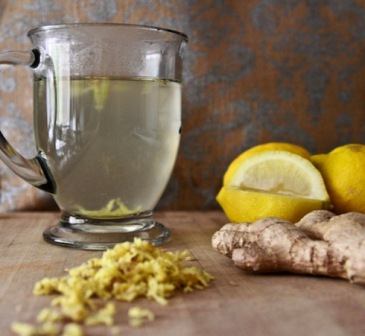Benefits of Ginger Water
and How to Make It
by Nancy Hearn, CNC
Note: As an Amazon Associate I earn from qualifying purchases.
The healing benefits of ginger water are well known around the world, and ginger water has been used throughout history for various ailments. In fact, in Ayurvedic medicine, it is known as a universal medicine.
Ginger is an aromatic, spicy root that is produced primarily in Southeast Asia since it grows best in warm, damp climates.
Ginger water, or ginger tea, is made by boiling fresh ginger root in water. You can also buy ginger in supplement or tea form, but the most effective use of ginger comes from boiling fresh ginger root in water.
Healing Components and Health Benefits
The active volatile oils and phenol compounds of ginger root are the components that provide the most healing benefits, according to researchers.
Fresh ginger water contains amino acids and a healthy dose of vitamin C as well as other antioxidants. It also contains an array of minerals, including calcium, sodium, zinc, and phosphorous.
Even though a long list of health benefits of ginger water have been attributed, the most significant and well-studied are the following three:
Digestive Aid
Ginger has been widely used throughout history to relieve nausea, to prevent seasickness, and as a treatment for digestive discomfort.
Ginger water can increase production of gastric juices, help the body absorb more nutrients, and help alleviate stomach pain and irritable bowel syndrome.
Anti-inflammatory
Studies have shown that drinking ginger water may help reduce inflammation throughout the entire body.
Ginger has been shown to be especially helpful for the swelling and joint pain associated with conditions such as rheumatoid arthritis and osteoarthritis.
A 2005 article in “Journal of Medicinal Food” noted that scientists had proven during the previous 25 years to support the long-held belief that ginger is an effective anti-inflammatory food.
Antioxidant
Ginger contains potent antioxidants that can help neutralize free radicals, which can cause oxidative stress and cell damage. Excessive free radicals in the body are produced by environmental factors (such as air and water pollution) as well as lifestyle factors, such as drinking excessive alcohol, smoking, overeating, and chronic stress.
The antioxidant and antimicrobial properties of ginger may help to prevent common colds and flus. In addition, ginger has shown to be beneficial in some instances for heart disease, diabetes, kidney disease, neurodegenerative diseases, as well as cancer.
How to Make Ginger Water
Ingredients: a piece of fresh ginger root, filtered drinking water, (optional for flavoring: lemon or honey)
1 Cup of Ginger Water - Grate 1 teaspoon of whole, unpeeled ginger root and boil 8-12 ounces of water. Stir the grated ginger into a cup of the hot water and steep for 2 minutes or so. Strain the ginger or just let it settle at the bottom of the cup.
1 Quart of Ginger Water - Chop a whole, unpeeled 2-inch piece of ginger into pieces and place in a 2-quart pan with one quart of filtered water. Bring the water with ginger in it to a boil, then reduce the heat and allow the ginger water to simmer for 15 minutes. Strain the tea and store it in a glass bottle or a thermos.
Hot or Cold: After making the ginger water, you can drink it hot or warm. Or you can refrigerate it and drink it cold.
Flavoring: To get the most benefits of ginger water, we believe it is best to drink it without any added flavoring. However, ginger has a strong taste and some people may want to add flavoring, such as honey or lemon juice to improve the taste.
Cautions: As with any herb or supplement, it is important to first check with your health practitioner if you are pregnant or breastfeeding, have an existing health condition or are taking medications. In general, side effects from ginger are rare but when taken in excess, you may experience gas, stomachache, heartburn or burning the mouth. It is best not to consume more than 4 grams of ginger a day.
Further reading . . .
Ginger Detox Bath for Healing and Rejuvenation
Return from Benefits of Ginger Water to Best Drinking Water
If you would like to reproduce or republish this article or any other article on this site, feel free to do so but please include a reference or link to the article at WaterBenefitsHealth.com.
Sign Up for Our Monthly
Newsletter
Visitor Comments
"This was the best and most straight forward info on the net yet. I asked a question and got an answer that made sense. Thank you so much!" - Linderlinder
FINALLY!!! I have been wondering about this for years with no 'solid' answer. This is exactly what I've been wanting to know! Thank you for this share..." by Andy
"Thank you for the information, Nancy. I appreciate it. Your article and findings are very helpful, referring to dehydration." - Carolyn
"Lemon water is one drink both my wife and I can't drink. It upsets our stomachs. We are in our sixties and in very good health—well, better health now that we drink about 2 liters plus of water each day. It has made so much difference to our digestive systems and recovery every day. Thank you for your website and effort." - Rod



